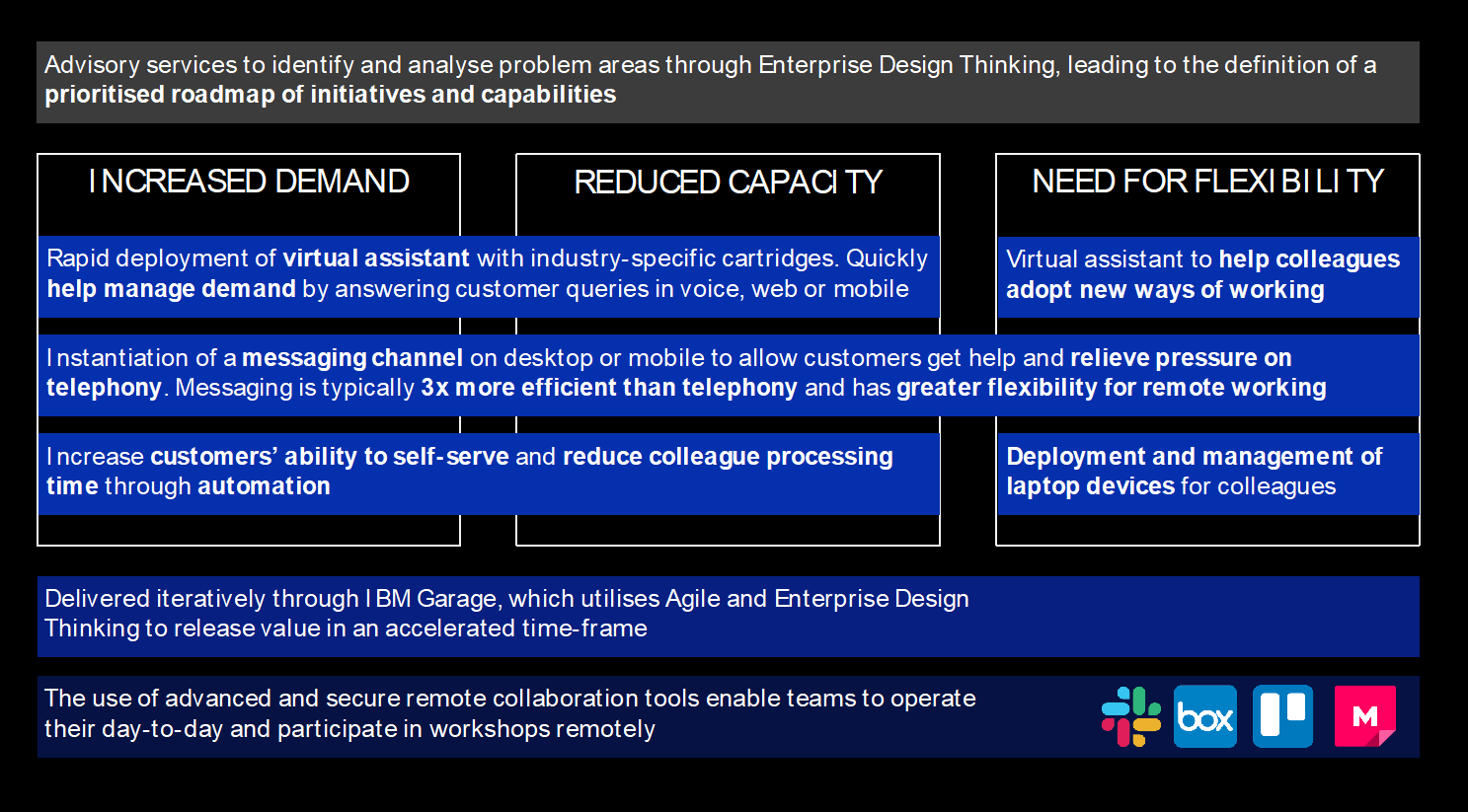Perspectives
Reinventing customer contact in light of the Covid-19 pandemic
27 April, 2020 | Written by: Michael Conway, Julie Lagan, and Joshua Majhutiak
Categorized: Perspectives
Share this post:
Overview:
During this time of great uncertainty, banks, utility providers and retailers are playing a greater role in society. Customers are worried about their finances, making sure they can access basic necessities and needing doorstep service.
With most face-to-face contact disappearing overnight, the contact centre has become the emergency beacon for vulnerable customers – and it’s a challenge for most to keep up with the demand. Not only are colleagues trying to serve anxious customers, but they are also juggling their own personal worries – safety in the workplace, a new remote routine, the juggling of childcare. What’s more, the wider operational team is still trying to use old strategies, processes and tools to help both colleagues and the business re-organise to the new normal.
Organisations need an immediate way of supporting their colleagues and customers at this crucial time and keeping their operation going. IBM’s Customer Contact Reinvention practice can help. In response to Covid-19, we have created a purpose driven ‘transformation accelerator’ for contact centres, that is already delivering for our client base – and is being implemented in days and weeks, as opposed to months and years.
Introduction:
Even before the Covid 19 crisis, cracks were starting to show in the contact centre business model. Customer expectations were being shaped by companies that had put customer service and satisfaction at the heart of their business model – Amazon, Uber or Apple. And customers are much more likely to be loyal to these brands because they trust them. The typical response to this was for Contact Centres to try to meet the customers where they were – to expand service to serve the needs of an increasingly mobile customer base, turning on channels without much of a view of the overarching customer and employee journey.
Contact centre directors face a catch-22. Under pressure to do more with less – they needed to meet or exceed rising customer expectations – while also reducing costs and streamline the operation. How do you do this when your organisation is run off inflexible legacy platforms that can’t easily adapt to sudden changes?
The Covid-19 pandemic has shone light on the shifting customer-business relationship and challenges in operational management. In the wake of huge uncertainty customers are anxious; they fear for the safety of friends and family; they worry about the consequences of one of the fastest and deepest economic downturns in history; customers seek re-assurance and guidance that they can trust. In the past two weeks this has led to huge increases in the volumes of contacts received by organisations, which is common across many industries;
- Travel operators receiving huge volumes of cancellation and compensation queries
- Banks are being asked to help customers who are in or foresee financial difficulty
- Service providers, such as media and utilities, being inundated with calls from customers who are concerned about their ability to pay bills
These spikes in demand from worried customers have put huge pressure on the operation. This is compounded further by a vastly reduced workforce due to colleague illness or needing to work from home to juggle childcare or look after relatives.
In response, many organisations have actually limited the functionality offered by or their contact centre, with some even switching it off completely. This highlights the inflexibility of operational design that can only really offer up a particular ‘type’ of service model. One where the business is overly reliant on:
- Human agents being in physical offices
- Colleagues being the siloed ‘keepers’ of all knowledge
- Legacy IVR platforms that struggle with the volume of calls and have a length lead time to make change
- Non-cloud-based infrastructure that does not offer the elasticity to quickly scale and meet demand
- A lack of self-serve journeys that customers can do through automation and “straight through processing”
Responding to challenges caused by Covid-19:
Organisations need an immediate way of supporting their colleagues and customers at this crucial time and keeping their operation going. Our clients have sought our help in answering these people and operation challenges, which can be summarised as:
- Increased demand
- Never-before-seen volumes of contact place pressure on the operation and technology
- Reduced capacity
- High levels of absenteeism due to illness and colleagues who have childcare or family to support
- Increased need for flexibility
- Continuous changes in policy from the government and a need to adapt to new ways of operating, such as remote working
Organisations need an immediate way of supporting their colleagues and customers at this crucial time and keeping their operation going. IBM can help. In response to Covid-19, we have created a purpose driven ‘transformation accelerator’ for contact centres, that is already delivering for our client base – and is being implemented in days and weeks, as opposed to months and years.
Below are some of the transformation accelerator initiatives:

A human approach to problem solving
Time is of the essence, so our approach to strategy is to quickly analyse problems from a colleague and customer perspective and identify opportunity areas, aiding clients to define a roadmap of initiatives and capabilities. We use Enterprise Design Thinking, which can make the process twice as fast to market.
Pre-designed transformation accelerator initiatives:
- In order to tackle increasing demand with a reduced workforce, IBM helps contact centres by rapidly deploying Virtual Assistants with industry-specific cartridges. These can quickly manage demand by answering ‘most common’ customer queries in voice, web or mobile as well as help colleagues adopt new ways of working
- We can increase the use of automation, to enable customers to self-serve and reduce colleague processing times
- IBM has designed better ways to deploy and manage secure laptop devices for colleagues, enabling organisations to support remote and flexible ways of working
- Messaging is typically 3 times more efficient than telephony and has great flexibility for remote working, which means our messaging channels on desktop or mobile will allow customers to get help and relieve pressure on telephony. It has the additional benefit of mitigating the issue of background noise in the home, as it is text based.
- IBM’s Colleague Virtual Assistants help colleagues find out up-to-date information and support. We are also using them to help colleagues adapt to new ways of working: ie remotely.
Rapid, remote delivery
- To release value in an accelerated time frame, we deliver using the IBM Garage Methodology, applying Agile and DevOps to ensure maximum alignment and long-term value.
- Remote delivery is seamlessly managed with the use of best-in-class remote collaboration tools such as Slack, Trello and Mural, enabling participation in workshops as well as carrying out daily operations in a virtual way.
Getting ahead:
Organisations have a duty to support colleagues and customers during the Covid-19 pandemic. As the face of the company, the contact centre is the emergency beacon, and shutting-up-shop, as many organisations have done, need not be the only answer.
Our purpose driven ‘transformation accelerator’ for contact centres can help design and deliver the support that your customers and colleagues need in these challenging times, in a matter of weeks.
Whether in crisis mode or looking to the future, the contact centre should no longer be seen as the a symptom of a problem – a gap in customer care or customer service design. Our Customer Contact Reinvention practice can not only answer an immediate need, but help you accelerate your transformation journey, ensuring that any steps you take now become an investment that also works for the future.
Talk to us today if you’d like to hear more, or read Michael’s favourite articles on customer contact reinvention, and how AI is changing the way work gets done.

Partner | FSS | UKI Business Transformation Services Leader

Customer Experience & Delivery Lead | IBM iX

Managing Consultant - IBM iX
Generative AI: driving a new era of HR transformation
Helen Gowler, Partner, EMEA Talent & Transformation Lead Today, I’m proud to be part of a company that’s committed to addressing gender bias in the tech industry. IBM is pioneering the use of AI to tackle this issue, and I’m excited to contribute to this effort. Our team is developing AI models that can detect […]
Multi-Modal Intelligence Platform
Traditionally, data management systems provided only numerical or textual based business intelligence primarily for back-office users across finance, sales, customer management and supply chain. Today, we are increasingly seeing data management systems which drive key business functions requiring interrogation of multi-modal data sets from documents, presentations, images, videos to audio. This demands a more sophisticated […]
The use of GenAI to Migrate and Modernise Organisational Core Programming Languages
GenAI is hugely powerful and supports a diversity of use cases by focusing on routine work – allowing people to focus time on value-add tasks, thus enhancing productivity. The focus of this use case is for an organisation which had previously focussed on a legacy set of tooling and programming languages and needed a way […]


